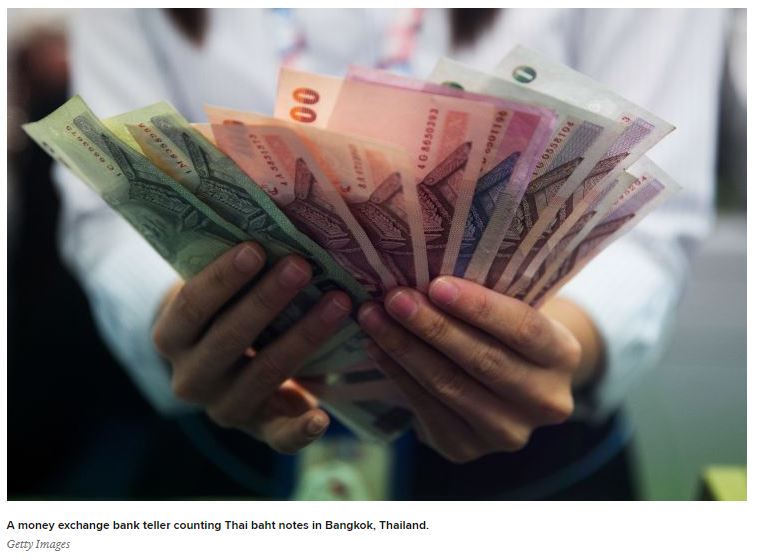Thailand’s currency keeps getting stronger and that’s sparking concerns
- Since the beginning of this year, Thailand’s currency has jumped more than 5% against the dollar. On a year-over-year basis, it has bounded even higher — nearly 8%.
- ”(The) strong currency is worsening the (Thai) economy’s plight by hurting exports further,” Prakash Sakpal, Asia economist at Dutch bank ING, tells CNBC.
- The country’s central bank could give in to pressure and cut rates to curb the rising baht, economists say
The Thai baht has soared against the U.S. dollar this year, significantly more than many other emerging market currencies.
That strength, however, is sparking concerns as the country’s domestic economy weakens, analysts said.
Since the beginning of this year, Thailand’s currency has jumped more than 5% against the dollar. On a year-over-year basis, it has bounded even higher — nearly 8%.
Other top performing emerging market currencies in the region have also strengthened against the dollar — but still lag behind the baht. Both the Indonesian rupiah and the Philippine peso, for instance, have risen more than 3% against the dollar so far this year.
“Policymakers and exporters in Thailand are once again voicing concern about the strength of the baht,” Gareth Leather, senior Asia economist at research firm Capital Economics, wrote in a note earlier this month. “While most (emerging market) currencies have appreciated against the US dollar in recent months, none have risen by as much as the baht.”
The strength of the baht has been supported by Thailand’s large trade surplus and a hawkish central bank, among other factors.
”(The) strong currency is worsening the (Thai) economy’s plight by hurting exports further,” Prakash Sakpal, Asia economist at Dutch bank ING, told CNBC.
A stronger currency makes the country’s exports more expensive, causing them to be less attractive in international markets.
Analysts at Singapore bank DBS said Monday that the strong baht is bad news for Thailand’s trade competitiveness. They cited a study by the Bank of Thailand, which showed that, for every 1% the baht strengthened against the dollar, it increases export prices — in dollar terms — by 0.3%.
Meanwhile, exports are already declining. They dropped for the third straight month in May, falling 5.79% from a year earlier. That was worse than the 3.6% decrease analysts had projected in a Reuters poll.
On Tuesday, data showed the country’s manufacturing output for June headed the same way: It fell 5.54% from a year earlier, which was worse than the forecast of a 3.15% decline.
“Considering these weak trade trends, together with a challenging outlook for regional growth … a strong currency comes at an inopportune time,” DBS analysts wrote, referring to slowing exports and imports, as well as declining tourism.
The country’s central bank could give in to pressure and cut rates to curb the rising baht, economists said. Still, they were not optimistic about the effectiveness of such a move.
“The (Bank of Thailand) could consider a rate cut to help reduce the baht’s yield appeal, but it will be no panacea,” DBS analysts said in their note, adding that a cut of 25 basis points would just undo a hike by the central bank last December.
ING’s Sakpal similarly said that any cut would see limited results.
“While this should stem the appreciation pressure somewhat, we may not see the (baht) being displaced from its best-performer emerging currency status just yet,” he said.
Source: https://www.cnbc.com/2019/07/31/thai-baht-strength-sparks-concerns-with-thailand-economy-slowing.html


 Thailand
Thailand




